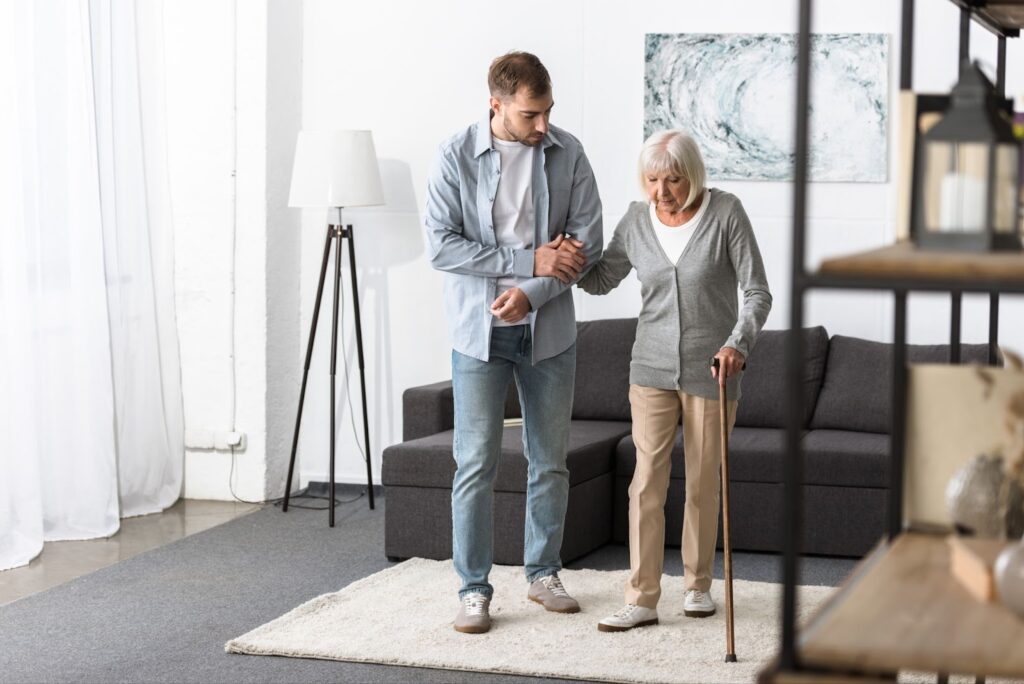Caring for a family member is both a labor of love and a challenging responsibility. Many family caregivers find themselves juggling work, children, and the needs of an aging parent—all while trying to maintain their own well-being.
The truth is sometimes your loved one’s needs exceed your ability to meet them. Other times, your loved one discovers they need more care than they can manage on their own. Recognizing when it’s time for personal care can be a daunting decision, but it’s essential for maintaining the health and happiness of everyone involved.
Be on the lookout for physical and mental health risks, difficulty managing daily activities, and loneliness. These could all be signs that it’s time for assisted living, also known as personal care.
Signs That It’s Time For Personal Care
There isn’t any single indicator for when your loved one should begin considering personal care. Many times, it’s a series of events that add up to it becoming a necessity. The best you can do is talk to your family members and keep watch for any of these issues:
Physical & Mental Health Decline
One major indicator is a noticeable decline in physical health, which may include:
- Frequent falls
- Unexplained weight loss/gain
- Worsening chronic conditions
- Slower recovery time from injuries
If you’re already caring for your loved one, these may signal that they require more care than you can provide. This is perfectly fine! Knowing your limits is an important part of being a caregiver.
While physical health is important, mental health is just as significant, though the signs can be a bit more subtle. Watch for:
- Confusion
- Memory loss
- Mood swings
These could even indicate dementia. Fortunately, some senior living communities have a specialized form of personal care made for seniors living with cognitive decline called memory care. It’s an excellent way for seniors with dementia or Alzheimer’s disease to live a full life with the support they need.
Difficulty Managing Daily Activities
Activities of Daily Living (ADLs) are essential tasks that people do every day to take care of themselves. When your loved one starts having difficulty performing these activities, it can be a sign they could benefit from personal care. Let’s break down these key activities and see how they highlight the need for additional support. The basic ADLs include:
- Mobility: Trouble moving around the house, getting in and out of bed, or standing up from a seated position can lead to a higher risk of falls and injuries. Personal care communities offer mobility assistance to keep residents safe.
- Eating: Difficulty eating, such as trouble handling utensils or even forgetting to eat, is a significant red flag. Personal care communities make sure residents have nutritious meals and help with consumption if needed.
- Dressing: If selecting appropriate clothes and dressing becomes challenging, it might be time for assistance. This can include picking out clothes, buttoning shirts, or tying shoes.
- Bathing and personal hygiene: Struggling to bathe or maintain personal cleanliness can lead to noticeable changes in appearance and even health issues. Personal care can help with washing, grooming, and other hygiene-related tasks.
- Bathroom needs: Managing bathroom needs can be deeply personal and challenging. Trouble getting to the restroom in time or using the toilet can be a sensitive indicator that extra help is required.
Social Isolation & Loneliness
Isolation and loneliness are significant concerns for seniors, affecting both their mental and physical health. If your loved one spends most of their time alone or has lost interest in hobbies and social interactions, it may be time to consider additional support.
A personal care community could provide the social engagement they crave, from arts and crafts to exercise classes, fostering a supportive environment where residents can form meaningful connections. Living in a vibrant, community setting can make a world of difference, helping enhance their overall quality of life and bringing joy back into their daily routines.
Benefits of Personal Care
Personal care communities can offer extensive health and safety benefits. From 24/7 medical support to emergency response systems, these communities are designed to keep residents safe and healthy.
One of the most significant advantages of personal care is the social aspect. Residents can interact with peers, participate in group activities, and build lasting friendships. This social engagement can significantly improve mental and emotional well-being.
For family caregivers, moving a loved one to personal care can provide much-needed peace of mind. Knowing that your loved one is in a supportive and safe environment allows you to focus on your own well-being and other responsibilities.
Discussing Personal Care with Your Family
It’s essential to involve your loved one in the decision-making process. Their input can guide you in selecting a community that meets their preferences and needs. This collaborative approach fosters a sense of autonomy and can ease the emotional burden of the transition.
Remember, open communication is crucial when considering a move to personal care. Have honest conversations with your loved one about their needs and listen to their concerns. Addressing fears and misconceptions early on can make the transition smoother for everyone involved.
Explore Personal Care at Brooklyn Pointe
Recognizing the signs that it’s time for personal care is the first step in supporting your loved one’s well-being. They deserve the best care, and you deserve the peace of mind that comes with knowing they are in a supportive, engaging environment. That’s what we offer at Brooklyn Pointe Assisted Living & Memory Care.If you’re ready to explore our personal care options, book a tour with us today and see firsthand how our community can enhance your loved one’s life. Experience the warmth, care, and vibrant social life that await them in their new home!

